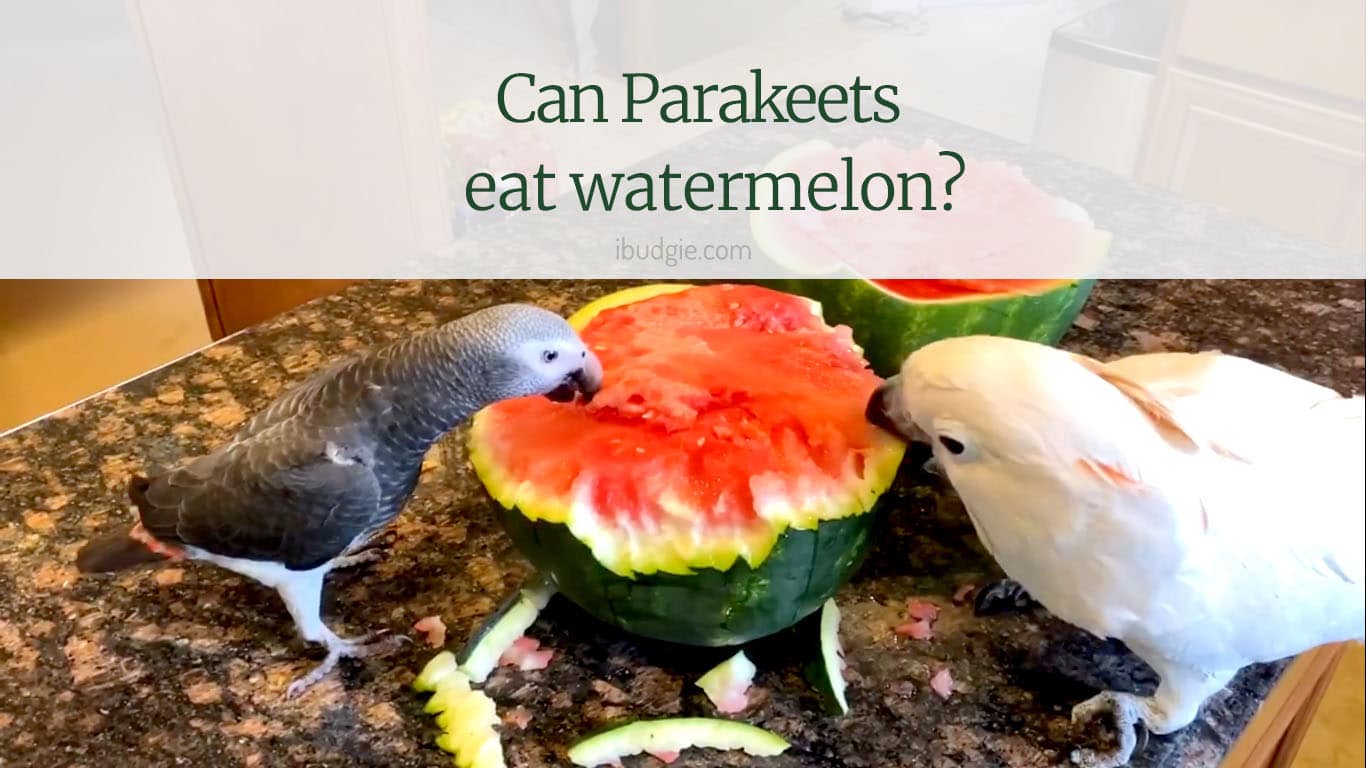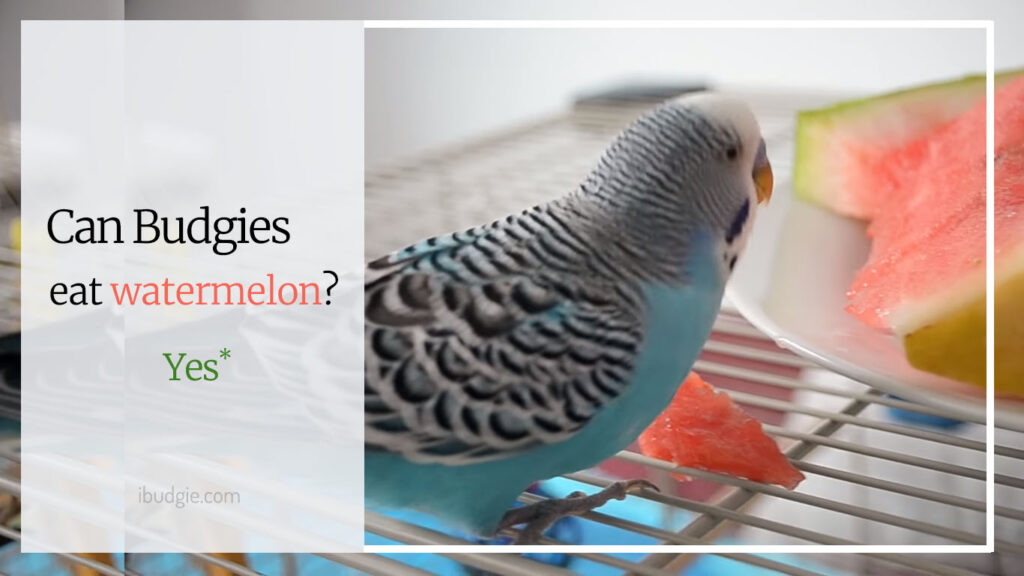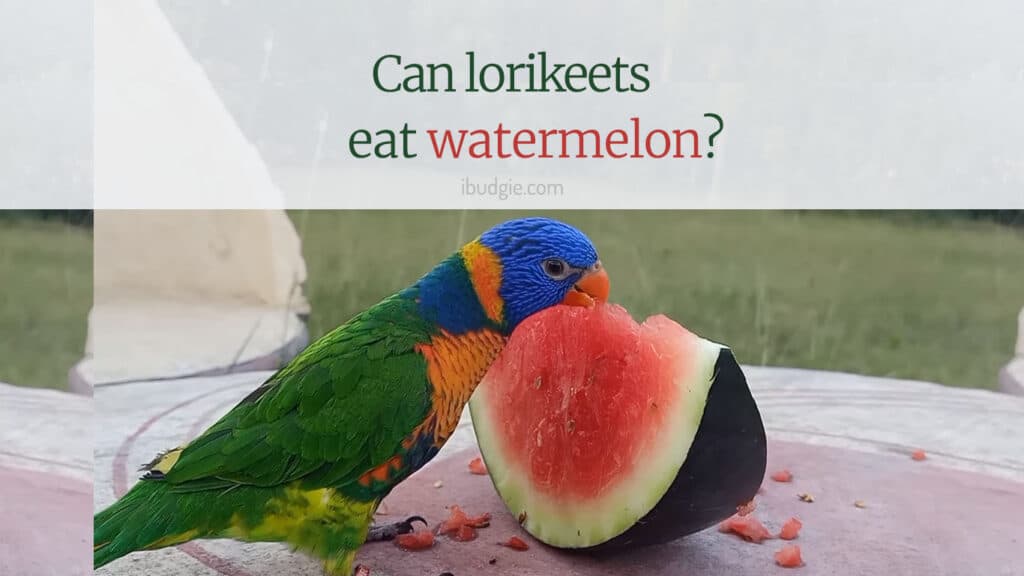Can parakeets eat watermelon?
Not all but most of the fruits that humans eat are safe for almost all parakeets including budgies. Therefore it’s recommended to research or ask an avian vet or any other experienced parakeet owner, before you feed something new fruit. What do you think of watermelons? Can parakeets eat watermelon? Can budgies eat watermelon? Are watermelons safe for parakeet budgies? Let’s find out the answers here.

Before diving into in-depth discussion about the benefits of feeding watermelon to any species of parakeets and budgies, let’s find out a general idea on whether or not parakeets eat watermelon.
Table of Contents
Can parakeets eat watermelon?
The definite answer is yes, parakeets can eat watermelon. Like other fruits, watermelon too have nutritional value, also it keeps parakeets hydrated as it is rich in water. However, you need to be cautious on the quantity and frequency you allow your parakeet to eat watermelon.
Nutritional benefit of watermelon
Watermelons are not only delicious but also equally nutritious fruit with various nutrients and minerals that parakeets require. Some of the healthy nutrients parakeet requires out of watermelon are Water, Vitamin A, Vitamin C, Protein, Potassium, Lycopene and Other Antioxidants. Further, let’s learn nutritional value for parakeets.
Water
During summer time, when your parakeet makes frequent trips to water bowls, this watermelon can be a good treat. Reason being watermelon contains nearly 90 percent of water which helps parakeets remain hydrated.
Vitamin A
Watermelon ranks nearly at the top among the fruits containing the highest amount of vitamin A. This vitamin in parakeets maintains the smooth function of their respiratory system. It’s also crucial for feather regeneration and maintenance processes, proper growth of beak, nails.
Vitamin C
Parakeets can’t express illness like we humans do. Also weak looking birds in the wild are the first prey of predators. Captive parakeets act similarly. They tend to hide their symptoms of sickness as a survival instinct. So, it’s a good idea to keep our parakeet’s immune system strong.
Vitamin C helps in keeping parakeets’ immune system strong and create antibodies. Feeding watermelon on a proper plan means we are already halfway in keeping our parakeet healthy. In parakeets lacking sufficient iron, Vitamin C takes the place of iron in red blood cell formation if necessary.
Protein
Parakeets draw energy from protein that they require for playing, flying and surviving. Proteins are macronutrients that are also required for overall health of parakeets. Protein helps to repair parakeet’s body cells and make new ones. Protein is also important for growth and development in baby parakeets, as well in breeding pairs.
Potassium
Potassium is beneficial in retaining water balance in the body of a parakeet. It also enhances and protects their nervous health, increases metabolism ability, as well as helps to strengthen bones.
Lycopene and Other Antioxidants
Lycopene is a plant nutrient containing antioxidant properties which is found in red fruit pigments such as watermelons. This nutrient helps parakeets to fight against severe health conditions like cancer and sunburns. Antioxidants present in the watermelon are useful in improving the health of parakeet’s body cells.
Besides these, watermelon also contains various other nutrients such as calcium, magnesium, iron, copper, carbohydrates and a series of vitamin B. All these nutrients enhance the parakeet’s health in some way. Therefore watermelons are healthy and safe to feed parakeets.
Can parakeets eat watermelon rind?
Green colored, rigid outer covering of watermelon is referred as rind. Many people and blog writings suggest avoiding watermelon rind from feeding parakeets. Do you think it contains real toxins that pose your parakeet’s health at risk?
The fact is, it is a good source of fiber and citrulline, an amino acid which helps in reducing muscle fatigue. But yes, watermelon rind is so much harder and rigid compared to other fruits.
Even if you chop watermelon rind into smaller pieces, there is still a high chance of choking your parakeet. You should also consider how it was grown, and kept. Most watermelons are grown and stored using pesticides which are harmful for parakeets. Therefore, my recommendation to every parakeet’s owner is to avoid watermelon rind.
Can parakeets eat watermelon seeds?
This question has controversial answers depending on the parakeet owner. If your parakeet belongs to Ringnecks, African grey, Macaw, or to say large species, there won’t be problem feeding watermelon seeds if they love it. In small parakeets like budgies, seeds may create choking hazards. So, it’s recommended to avoid for small parakeets. You can also avoid for larger parakeets because we don’t want our feather friend in trouble.
Can budgies eat watermelon?

Yes, budgies can eat watermelon. In fact, including budgies most of the parakeets adore watermelon. Even if your budgies are eating it for the first time, chances are they will give a good bite.
Feeding watermelon under moderation can have amazing benefits. Instant benefit of water rich watermelon for budgies is, it helps to cool down and stay hydrated on summer days. In the long run, watermelon helps in creating antibodies to keep budgies beak and nails flake-free.
Budgies are small parakeets, feeding too much watermelon at once or feeding on a regular basis may create problems. Watermelon is sweet, too much of sugar is not good for budgie’s health.
Can budgies eat watermelon rind?
Once again, the possibility of choking hazard and harmful pesticides are the reasons why you should not give watermelon rind to your budgies. Compared to other fruits, watermelons have harder and chunkier skin, which is not easy to bite for small parakeets like budgies.
Can budgies eat watermelon seed?
Budgies are considered truly granivorous, almost 80 percent of their diet includes seeds. So you may think why is it an issue here?
We already discussed, watermelon seeds in general don’t contain any toxic substances that can be harmful to parakeet budgies. The only issue is that the seeds pose a choking hazard in our little beautiful creature. You can imagine how frustrating the scenario can be, which is why it’s recommended to avoid watermelon seeds.
Another good reason to avoid the seeds is that they don’t offer much nutrition compared to the mesocarp ( edible part ) of watermelon. Remove seed before feeding watermelon to budgies or you can buy seedless watermelon specially for your lovely budgies.
Can budgies eat cold watermelon?
In humans, cold food very quickly changes body temperature. So happens with the budgie’s body temperature.
Budgies have much higher metabolism than we do, so it is important to maintain a high body heat constantly for their body to function properly. When a budgie eats cold watermelon it slows down their whole system, which takes a longer time to try and get their body temperature back up. If your budgie was already weak for some reason or if it was under stress or molting, they might not be able to resist the drastic change in temperature.
Budgies in the wild eat fruits in their natural state, so it’s better if you serve watermelon at its natural temperature.
Budgies poop after eating watermelon
Metabolism in budgies is so fast, they keep eating and pooping. If you are serving your budgie with watermelon for the first time. You surely get scared seeing the poop nearly after 30 mins to an hour.

After eating watermelon or any red fruit, budgie poop will be more watery and reddish, much differ than their normal poop. This is normal poop after eating reddish fruits. So you don’t need to be worried with this poop color and structure.
If you see more of the red colored poop, during a normal diet schedule too, you should immediately visit an avian vet.
Can lorikeets eat watermelon?

Yes, lorikeets love to eat watermelon and it is a safe fruit to feed. Lorikeets are fond of sweet liquid and the seeds in the watermelon are great fun. Be cautious on feeding watermelon seeds, as it may create choking problems.
Can lovebirds eat watermelon?
If you read this blog article thoroughly, then you already know the answer, benefits and things you need to be cautious while feeding watermelon to your parakeet.
Lovebirds being one of the species of parakeet family, they can eat watermelon and this fruit is safe for them too. You can share your summer party watermelon with your lovebirds. Don’t provide watermelon rind as it may lead to choking problems. Also don’t feed too much at a time, or too frequently.
How to serve watermelon to your parakeets?
Keeping parakeets’ health and safety as a great concern, you can chop watermelon into rind less pieces, remove seeds or buy seedless watermelon. Depending on the number of parakeets dining at once, provide the right amount of fresh watermelon. Watermelon at its natural temperature is recommended. Remove any leftovers after a few hours, clean the mess so that no bacteria gets produced.
Find out other safe and unsafe fruits parakeet budgies can eat.
When did you feed your parakeet watermelon for the first time? Did the poop after eating watermelon scared you? Your comment helps others to be aware. Sharing is caring. 🙂
